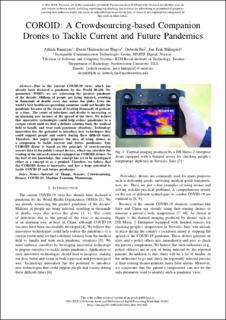| dc.contributor.author | Rauniyar, Ashish | |
| dc.contributor.author | Hagos, Desta Haileselassie | |
| dc.contributor.author | Jha, Debesh | |
| dc.contributor.author | Håkegård, Jan Erik | |
| dc.date.accessioned | 2022-10-05T12:39:10Z | |
| dc.date.available | 2022-10-05T12:39:10Z | |
| dc.date.created | 2022-07-29T13:56:46Z | |
| dc.date.issued | 2022 | |
| dc.identifier.citation | Proceedings of the IEEE Sensor Array and Multichannel Signal Processing Workshop. 2022, 216-220. | en_US |
| dc.identifier.issn | 1551-2282 | |
| dc.identifier.uri | https://hdl.handle.net/11250/3024075 | |
| dc.description.abstract | Due to the current COVID-19 virus, which has already been declared a pandemic by the World Health Organization (WHO), we are witnessing the greatest pandemic of the decade. Millions of people are being infected, resulting in thousands of deaths every day across the globe. Even the world’s best healthcare-providing countries could not handle the pandemic because of the strain of treating thousands of patients at a time. The count of infections and deaths is increasing at an alarming rate because of the spread of the virus. We believe that innovative technologies could help reduce pandemics to a certain extent until we find a definite solution from the medical field to handle and treat such pandemic situations. Technology innovation has the potential to introduce new technologies that could support people and society during these difficult times. Therefore, this paper proposes the idea of using drones as a companion to tackle current and future pandemics. Our COROID drone is based on the principle of crowdsourcing sensors data of the public's smart devices, which can correlate the reading of the infrared cameras equipped on COROID drones. To the best of our knowledge, this concept has yet to be investigated either as a concept or as a product. Therefore, we believe that the COROID drone is innovative and has a huge potential to tackle COVID-19 and future pandemics. | en_US |
| dc.language.iso | eng | en_US |
| dc.publisher | Institute of Electrical and Electronics Engineers (IEEE) | en_US |
| dc.subject | Covid-19 | en_US |
| dc.subject | Covid-19 | en_US |
| dc.subject | Internet of Things | en_US |
| dc.subject | Internet of Things | en_US |
| dc.subject | Droner | en_US |
| dc.subject | Drones | en_US |
| dc.subject | Maskinlæring | en_US |
| dc.subject | Machine learning | en_US |
| dc.title | COROID: A Crowdsourcing-based Companion Drones to Tackle Current and Future Pandemics | en_US |
| dc.title.alternative | COROID: A Crowdsourcing-based Companion Drones to Tackle Current and Future Pandemics | en_US |
| dc.type | Peer reviewed | en_US |
| dc.type | Journal article | en_US |
| dc.description.version | acceptedVersion | en_US |
| dc.subject.nsi | VDP::Kommunikasjon og distribuerte systemer: 423 | en_US |
| dc.subject.nsi | VDP::Communication and distributed systems: 423 | en_US |
| dc.subject.nsi | VDP::Kommunikasjon og distribuerte systemer: 423 | en_US |
| dc.subject.nsi | VDP::Communication and distributed systems: 423 | en_US |
| dc.source.pagenumber | 216-220 | en_US |
| dc.source.journal | Proceedings of the IEEE Sensor Array and Multichannel Signal Processing Workshop | en_US |
| dc.identifier.doi | 10.1109/SAM53842.2022.9827805 | |
| dc.identifier.cristin | 2040082 | |
| dc.relation.project | Norges forskningsråd: 300102 | en_US |
| cristin.ispublished | true | |
| cristin.fulltext | postprint | |
| cristin.qualitycode | 1 | |
